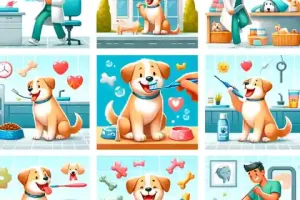What is dilated cardiomyopathy in dogs? Dilated Cardiomyopathy (DCM) is a big word for a heart condition in dogs. It makes the heart bigger and weaker. This means the heart can’t pump blood as well as it should. Let’s dive into what causes this condition and how we can help our furry friends.
What is dilated cardiomyopathy in dogs?
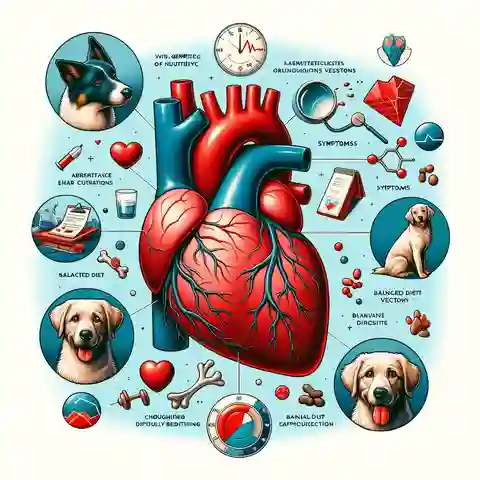
In DCM, a dog’s heart gets larger. The heart’s chambers get bigger, and the walls of the heart get thinner. Imagine a balloon that stretches out; it becomes bigger but weaker. That’s what happens to the heart in DCM.
What Causes Dilated Cardiomyopathy in Dogs
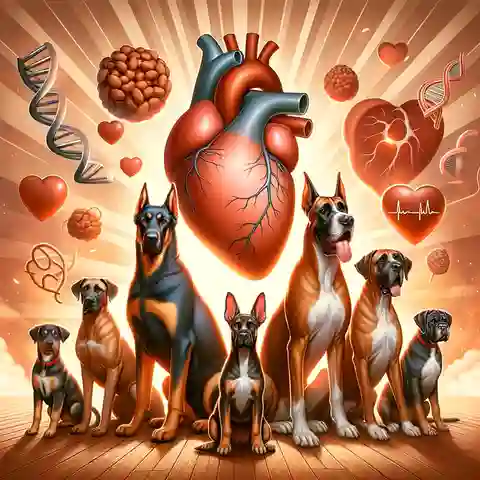
Dogs are like our family, and just like us, they can get heart problems. One of these heart problems is called Dilated Cardiomyopathy (DCM). It’s a fancy name for when a dog’s heart gets too big and can’t pump blood as well as it should. Here is what causes this in dogs.
Genetics: It’s in Their Genes
- Some dog families are more likely to have DCM. It’s like how some families have lots of people with blue eyes.
- Big dogs like Doberman Pinschers, Great Danes, and Boxers often have this heart problem. It’s something they can get from their mom and dad dogs.
Nutrition: What They Eat Matters
- Just like you need to eat your veggies to stay healthy, dogs need the right food to keep their hearts strong.
- Their hearts can get sick if they don’t get enough of certain good stuff, like taurine and carnitine. These are special nutrients that help keep their heart pumping right.
Age and Size: Growing Older and Bigger
- Older dogs, especially the big ones, are more likely to get DCM. It’s like how some things get worn out as they age.
- Middle-aged to older dogs and those who are bigger have a higher chance of having a heart that’s too big.
Other Health Issues: When Other Sicknesses Affect the Heart
- Sometimes, other health problems can make the heart sick. How the heart beats or fights off germs could be wrong.
- It’s like when one part of a machine breaks and makes other parts stop working right.
Symptoms of Cardiomyopathy in Dogs
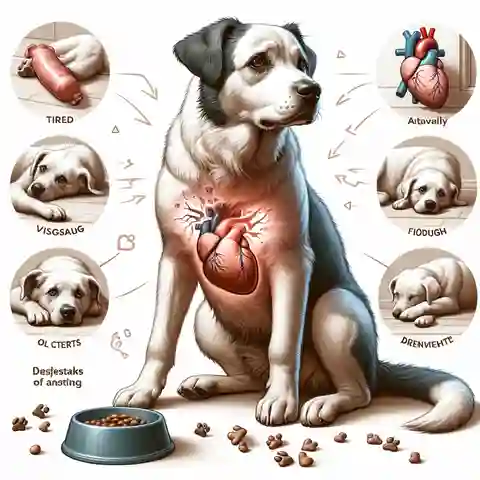
When a dog has cardiomyopathy, it means their heart is not working right. The symptoms can vary, but here are some common ones to look out for:
- Tiredness: Dogs with this heart problem may seem more tired than usual. They might not want to play or go for walks like they used to.
- Coughing: If your dog starts coughing a lot, it could be a sign that their heart isn’t pumping blood well.
- Hard Time Breathing: You might notice your dog breathing heavily or faster, even when they’re resting. This can happen because their body is trying to get more oxygen.
- Fainting: Sometimes, dogs with heart issues can faint. This might happen if their heart can’t pump blood properly to their brain.
- Swollen Belly: A dog’s belly might get swollen if fluid builds up. This can happen when their heart isn’t working right.
- Not Eating Well: Dogs with heart problems might not feel like eating. They could lose weight because they’re not interested in food.
- Weakness: Your dog might seem weak or have trouble getting up and moving around.
If you see any of these signs in your dog, it’s important to go to the vet. They can check your dog’s heart and help them feel better.
Taking good care of your dog and watching for these signs can help keep their heart as healthy as possible. Your vet is always there to help and give advice on what’s best for your furry friend.
Preventing Cardiomyopathy in Dogs
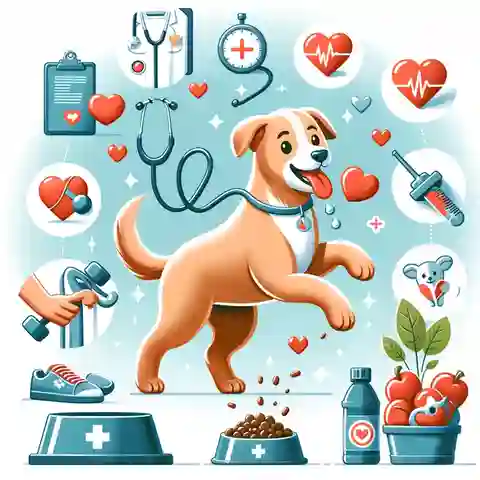
Preventing heart problems like cardiomyopathy in dogs can be tricky, especially because genetics play a big role. Here’s what you can do:
1. Pick the Right Food
- Balanced Diet: ensure your dog eats food that has all the nutrients they need. This support maintains the health of their heart and the rest of their body.
- Watch for Taurine: Some dogs might need more of a taurine nutrient in their Diet to help prevent heart issues.
2. Regular Vet Visits
- Check-ups: Regularly taking your dog to the vet helps catch any heart issues early.
- Ask Questions: Talk to your vet about your dog’s risk for heart troubles and what you can do.
3. Keep Them Fit
Exercise: Regular, not-too-hard training helps support your dog’s heart health. Think of fun activities you can do together!
- Healthy Weight: Maintaining your dog at a proper weight is essential. Being too heavy can cause heart issues to worsen.
4. Know the Signs
- Stay Alert: Learn what signs might mean your dog has a heart problem, like getting tired easily, coughing, or breathing.
- Act Fast: If you notice any signs, immediately take your dog to the vet.
5. Care for Their Teeth
- Dental Health: Caring for your dog’s teeth can help prevent infections that might hurt their heart.
Stages of Cardiomyopathy in Dogs
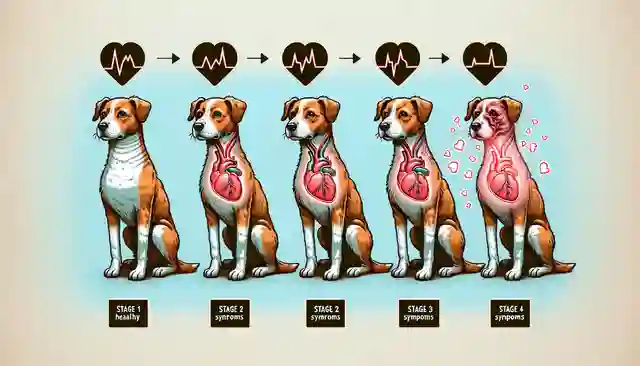
Cardiomyopathy in dogs is a heart condition that progresses through different stages. Understanding these stages helps in managing the condition better. Here’s a breakdown of the stages:
Stage 1: Early Stage
- No Visible Symptoms: Dogs show no signs of illness, making it hard to detect without a vet’s help.
- Diagnosis: Often diagnosed through routine checks or tests done for other reasons.
Stage 2: Mild Stage
- Mild Symptoms: Slight changes in behavior or activity may be noticeable. Dogs might get tired more easily and show less enthusiasm for exercise.
- Detection: Detected through more specific heart function tests.
Stage 3: Moderate Stage
- Clear Symptoms: Symptoms become more obvious. This includes coughing, difficulty breathing, and reduced tolerance for exercise.
- Vet Care Needed: Regular monitoring by a vet is crucial. Medications might be prescribed to help manage symptoms.
Stage 4: Severe Stage
- Severe Symptoms: Dogs show significant signs of heart failure, such as constant coughing, difficulty breathing, fainting, and a swollen belly due to fluid buildup.
- Intensive Care: Dogs need intensive care and treatment. The focus is on improving quality of life and managing symptoms.
Treatment for Cardiomyopathy in Dogs
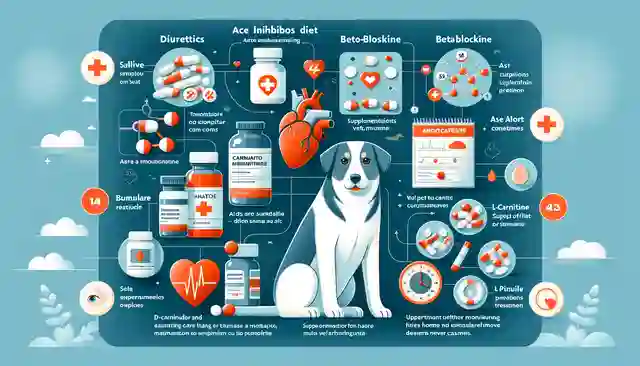
When a dog has cardiomyopathy, it means their heart is not working right. Here’s how vets help dogs with this heart problem:
Medications
- Diuretics: These help get rid of extra fluid in the body. This can make it easier for your dog to breathe and help with a swollen belly.
- ACE Inhibitors: These medicines help open up blood vessels, making it easier for the heart to pump blood.
- Beta-Blockers: These can help control the heart rate and make the heart work better.
- Pimobendan: This medicine helps the heart pump more strongly and can be very helpful for dogs with cardiomyopathy.
Diet and Supplements
- Low-Salt Diet: Eating less salt can help prevent fluid from building up in the body.
- Taurine and L-Carnitine: These are special nutrients that might help some dogs, especially if their cardiomyopathy is linked to not having enough of these in their diet.
Regular Check-Ups
- Vet Visits: Regular visits to the vet are important. The vet can check how your dog is doing and make changes to their treatment if needed.
Exercise
- Light Exercise: Some exercise is good, but it’s important not to overdo it. Gentle walks are usually okay, but ask your vet what’s best for your dog.
Monitoring at Home
- Watch for Changes: You know your dog best. If you see changes in how they’re acting, eating, or breathing, tell your vet. This can help catch problems early.
Advanced Treatments
- For Severe Cases: Sometimes, when the heart problem is very serious, dogs might need more help. This can include things like special procedures or surgeries. But this depends a lot on the dog and how severe their condition is.
Every dog is different, and what works best can vary. It’s important to work closely with your vet.
Food for Dogs with Cardiomyopathy
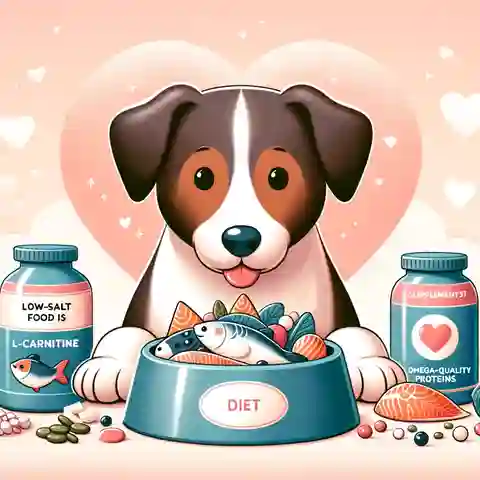
When a dog has cardiomyopathy, what they eat becomes very important. The right food can help their heart work better. Let’s talk about the best food choices for dogs with this heart condition.
Good Food Helps
- Low-Salt Food: Salt can make the body hold onto water. This is not good for dogs with heart problems. Foods low in salt help keep their body from holding too much water.
- Taurine and L-Carnitine: These are special nutrients that help the heart muscle. Some dogs might not have enough of these in their body. Eating food with taurine and L-carnitine can help their heart.
- Omega-3 Fatty Acids: This kind of fat is good for the heart. Foods like fish oil can give dogs these healthy fats.
- High-Quality Protein: Dogs need protein, but it has to be easy for them to digest. Good protein helps them stay strong without making the heart work too hard.
- Less Fat: Too much fat is not good for dogs with heart problems. Foods with less fat help keep their heart from getting too stressed.
Picking the Right Food
- Talk to Your Vet: Your vet knows what’s best for your dog’s heart. They can suggest the best food for your dog.
- Read the Labels: Look for foods that say “low sodium” and have taurine, L-carnitine, and omega-3 fatty acids.
- Be Careful with Treats: Treats can have a lot of salt and fat. Pick treats that are good for the heart.
Some people like to make food for their dogs at home. This is okay, but you have to be very careful. Make sure the food has all the nutrients your dog needs. Your vet can help you make a good plan.
Life Expectancy with Cardiomyopathy in Dogs
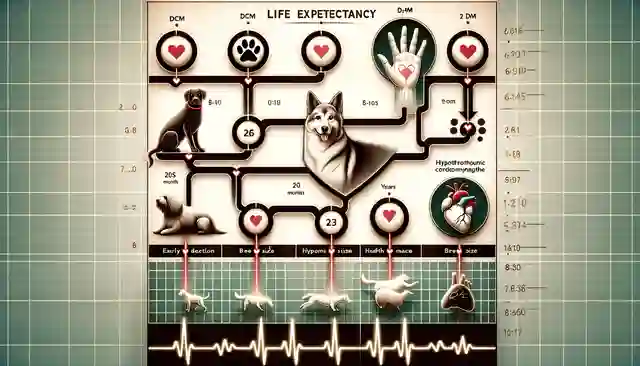
When dogs have a heart problem called cardiomyopathy, how long they can live with it can change a lot. It depends on the problem found, how healthy the dog is otherwise, and how well the problem is handled. Here’s a general overview:
Factors Affecting Life Expectancy
- Finding the Problem Early: If the vet finds the heart problem soon and starts helping right away, the dog might live longer and feel better.
- What Kind of Dog: Big dogs, like Doberman Pinschers, Great Danes, and Boxers, might not live as long with this heart problem as smaller dogs.
- Different Heart Problems: There are different kinds of heart problems. One kind, called DCM, is harder on dogs than another kind, called HCM.
- Taking Good Care: It’s very important to go to the vet a lot, take medicine the right way, eat healthy, and exercise just the right amount.
General Life Expectancy Guidelines
- With DCM: Dogs with DCM and heart failure signs might live from 6 months to 2 years with really good care. But it’s different for each dog.
- With HCM: HCM isn’t as common. Dogs with HCM might live for several years with the right care, but sometimes they might get sudden heart problems.
Making Life Better for Dogs with Heart Problems
We want to make sure dogs with heart problems are happy and comfy. Here’s how we can help:
- See the Vet a Lot: It’s important for dogs to visit their vet often so the vet can check on their heart.
- Take Medicine the Right Way: If the dog has medicine from the vet, we need to make sure they take it just like the vet says.
- Eat Healthy and Exercise: Eating good food and getting the right amount of exercise helps keep their heart strong.
- Give Lots of Love: Making sure dogs know they’re loved and feel comfy at home is super important.
Why Loving and Care for Dogs is Important
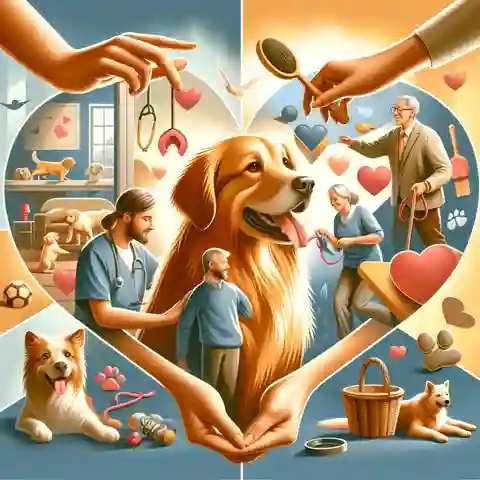
Taking care of a dog means more than just giving them food and a place to sleep. It’s also about making sure they feel loved and happy. Here’s why:
1. They Feel Happier
Dogs love being around us. When you play, hug, or just hang out with them, they feel super happy and safe. This helps them not to feel worried or sad.
2. They Stay Healthier
Loving your dog can actually keep them from getting sick. When dogs are stressed, they can get ill just like we do when we’re worried. But, feeling loved makes them stronger and healthier.
3. They Learn Better
When you give your dog lots of love and tell them they’re doing great, they learn what you like them to do. Dogs that don’t get much attention might start doing things we don’t like, but happy dogs want to make us happy too.
4. You’ll Be Closer
Spending lots of time with your dog makes your friendship even stronger. This makes it easier to teach them new things and helps them listen better.
5. You’ll Notice if They’re Sick
If you know your dog really well, you’ll quickly see if they’re not feeling good. Maybe they’re not eating much or don’t want to play. This means you can help them get better faster.
6. It’s Good for You Too
Guess what? When you take good care of your dog, you feel better too. Hanging out with dogs can make us feel more relaxed and happy.
7. Happy Dogs Are Healthier
Dogs that get lots of love have less worry and feel better. This means they’re not as likely to get sick.
Ways to Show Your Dog Love
- Spend Time Together: Go for walks, play, or just chill and pet them.
- Talk to Them: They might not get all the words, but they feel happy when you talk to them.
- Keep Them Healthy: Take them to the vet when they need to go, give them good food, and make sure they get to run and play.
- Understand Them: Sometimes dogs have off days too. Being patient shows them you care no matter what.
So, remember, taking good care of your dog and showing them lots of love makes them happy, healthy, and great friends. It’s the best thing you can do for them and for you!
Conclusion
Dilated Cardiomyopathy in Dogs is a serious condition, but understanding it is the first step towards helping our pets. Understanding the causes, signs, and ways to help can enhance our dogs’ lives. Let’s give our dogs the love and care they deserve and keep their souls healthy!
Constantly talk to your vet if you’re anxious about your dog’s health. They can deliver the best advice on managing for your furry friend.


